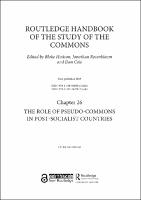Chapter 26 The Role of Pseudo-Commons in Post-Socialist Countries
Proposal review
| dc.contributor.author | Theesfeld, Insa | |
| dc.date.accessioned | 2019-10-17 14:29:54 | |
| dc.date.accessioned | 2020-04-01T10:33:23Z | |
| dc.date.available | 2020-04-01T10:33:23Z | |
| dc.date.issued | 2019 | |
| dc.identifier | 1004805 | |
| dc.identifier | OCN: 1100534965 | en_US |
| dc.identifier.uri | http://library.oapen.org/handle/20.500.12657/25292 | |
| dc.description.abstract | If Hardin’s (1968) widely cited case of a pasture accessible to everyone were the standard for public natural resources, those resources would have the tendency to be depleted, degraded, destroyed or overexploited. Hardin explains that each herdsman found it more profitable to graze more animals than the pasture could support, since each took all the profit from an extra animal but bore only a fraction of the cost of overgrazing. Yet, what Hardin calls a “Tragedy of the Commons” is rather a “Tragedy of Open Access” (Feeny et al., 1990), since Hardin confuses the characteristics of a resource, such as low excludability and high rivalry in consumption, with its property rights regime which can take diverse forms. Hardin describes an open access system, meaning no rules and no property rights regime in place, that leads to overuse and degradation, instead of a resource that is held in common. Later, Hardin (1994) refers to the same case as an “unmanaged commons”. With his pasture example, he aimed to contradict the laissez-faire attitude shared by economists in the late 1800s, which was that if each man pursued his own interest then the interests of all would be best served in the long run. To motivate this chapter, I will recall four possible methods of natural resource management that can resolve this tragedy. I will also highlight the fourth, often overlooked approach, i.e. the public manager option. In fact, there is a continuum between the two polar ends of the spectrum, from governance enacted by a single central authority to a fully decentralized system of individual decision making. Between these two extremes lies a range of governance regimes that might involve higher levels of government along with local systems (Theesfeld, 2008a; Frey et al., 2016). | |
| dc.language | English | |
| dc.subject.classification | thema EDItEUR::J Society and Social Sciences | en_US |
| dc.subject.other | Natural resource management | |
| dc.subject.other | methods | |
| dc.subject.other | pseudo-commons | |
| dc.subject.other | post-socialist countries | |
| dc.title | Chapter 26 The Role of Pseudo-Commons in Post-Socialist Countries | |
| dc.type | chapter | |
| oapen.relation.isPublishedBy | 7b3c7b10-5b1e-40b3-860e-c6dd5197f0bb | |
| oapen.relation.isPartOfBook | d52ef6ed-71e9-44c6-bd18-84607464665e | |
| oapen.relation.isbn | 9781315162782 | |
| oapen.imprint | Routledge | |
| oapen.pages | 17 | |
| oapen.remark.public | 3-8-2020 - No DOI registered in CrossRef for ISBN 9781138060906 | |
| oapen.identifier.ocn | 1100534965 | |
| peerreview.anonymity | Single-anonymised | |
| peerreview.id | bc80075c-96cc-4740-a9f3-a234bc2598f1 | |
| peerreview.open.review | No | |
| peerreview.publish.responsibility | Publisher | |
| peerreview.review.stage | Pre-publication | |
| peerreview.review.type | Proposal | |
| peerreview.reviewer.type | Internal editor | |
| peerreview.reviewer.type | External peer reviewer | |
| peerreview.title | Proposal review | |
| oapen.review.comments | Taylor & Francis open access titles are reviewed as a minimum at proposal stage by at least two external peer reviewers and an internal editor (additional reviews may be sought and additional content reviewed as required). |

